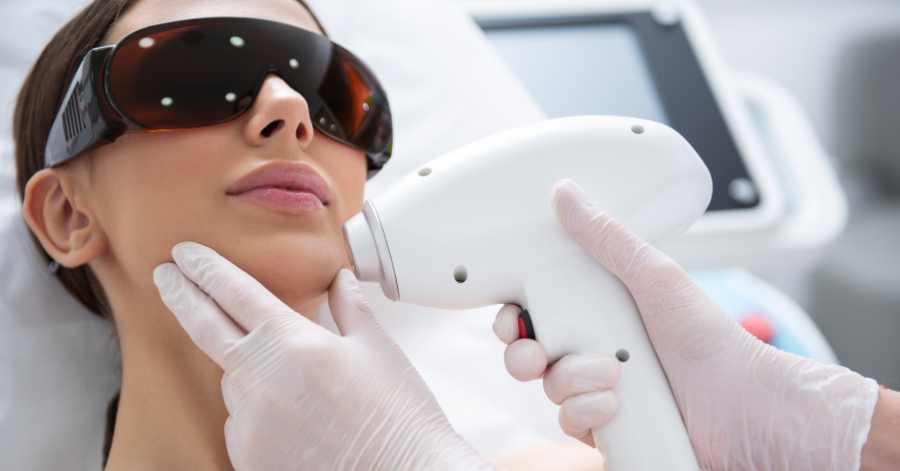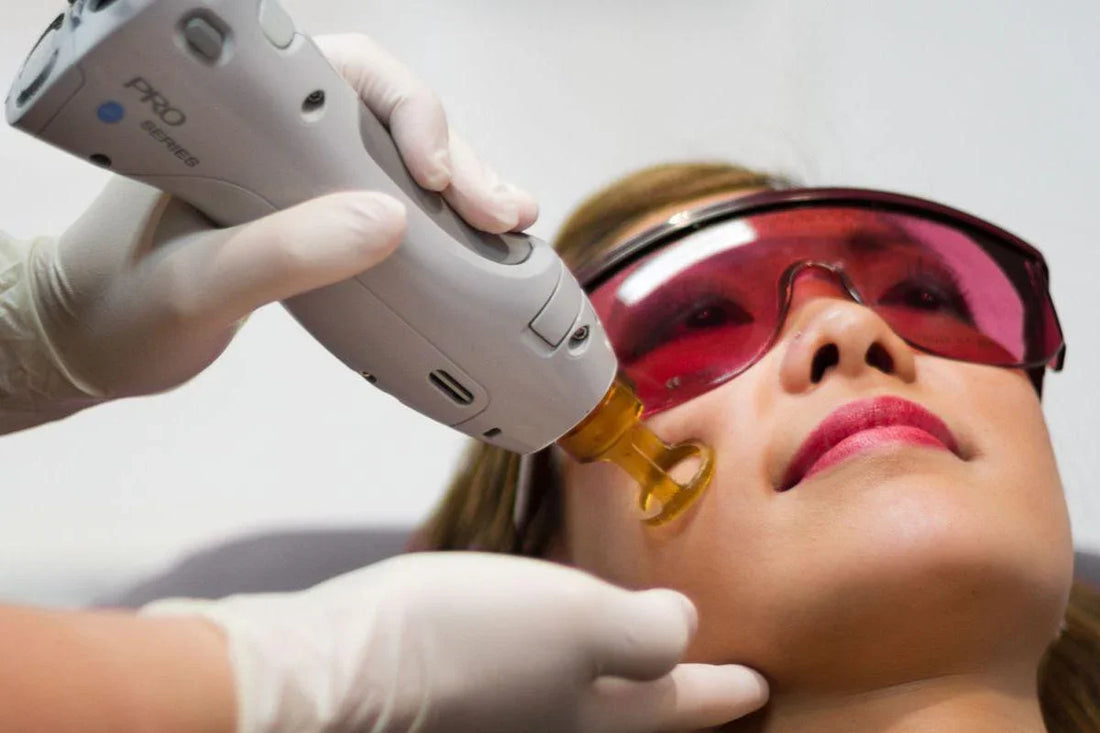Table of Contents
Laser hair removal is one of the most common methods for hair removal, utilizing laser light to target unwanted hair. However, this procedure comes with several side effects, making it unsuitable for certain individuals.
For individuals with dark skin and light hair, laser hair removal may be less effective and could potentially damage the skin or affect skin pigmentation. People with skin conditions such as acne, warts, infections, or wounds should avoid laser hair removal to prevent irritation and the worsening of existing skin problems.
Who Should Avoid Laser Hair Removal?
1. Pregnant and Breastfeeding Women
Laser hair removal is not recommended during pregnancy. The main reason is that no direct studies have been conducted on humans to determine the effects of laser hair removal during pregnancy. Therefore, its safety for the fetus has not yet been proven.
Some pregnant women may consider laser hair removal due to increased hair growth, especially around the chest and abdomen, during pregnancy. However, it's important to note that much of this excess hair typically disappears over time and does not require laser removal. For this reason, pregnant women and breastfeeding mothers are advised to avoid laser hair removal.
2. Individuals with Specific Medical Conditions
Certain medical conditions, such as diabetes, can negatively impact the effectiveness and safety of laser hair removal. For individuals with diabetes, nerves and body tissues are more sensitive to pain and prone to burns or blisters. Additionally, wounds may take longer to heal, increasing the risk of infection and prolonging recovery time.
As a result, individuals with diabetes are at a higher risk during laser treatments, making it essential to exercise caution or avoid the procedure altogether.

3. Individuals Taking Antibiotics
Antibiotics can make the skin more sensitive to light, a condition known as photosensitivity. This reaction causes inflammation in skin exposed to light and can be triggered by certain medications or substances. Under these circumstances, the skin is more prone to heat-induced damage during laser hair removal, which may result in side effects such as hives, blisters, fever, fatigue, and persistent pain. For this reason, individuals taking antibiotics should avoid laser treatments.
4. Taking Certain Vitamin Supplements
Many people take vitamin supplements after consulting their doctor, including blood thinners or high doses of specific vitamins like vitamin E. However, they might not realize that these supplements can negatively affect the effectiveness and safety of laser hair removal, particularly with devices like the Candela Alex. For such individuals, laser hair removal may pose risks and should be avoided.
5. Using Cosmetic and Skincare Products
The use of cosmetic and skincare products before laser hair removal sessions is strongly discouraged. Laser energy must be absorbed by the melanin or pigments in the hair follicles, and anything that interferes with this process can not only reduce the laser's effectiveness but also damage the skin. While recovery times vary from person to person, the skin typically heals within 24 to 48 hours, after which cosmetic and skincare products can be safely used again.
Deodorants, roll-ons, or any skincare product that forms a layer on the skin should also be avoided before laser sessions. Some deodorants leave residues even after being washed off, which can reflect laser light. This reflection causes the laser energy to be absorbed by the leftover product rather than the hair follicle, reducing the treatment's effectiveness and potentially harming the skin. To avoid these risks, it is recommended to refrain from applying deodorant to the treatment area at least 24 hours before your laser session.
6. Individuals with Cold Sores
Active infections such as cold sores in the treatment area can negatively impact the laser hair removal process. However, once the condition is fully treated, laser sessions can begin. If you frequently experience cold sores, it is advisable to take prophylactic antiviral medication before your laser sessions to prevent outbreaks.
Additionally, active cold sores can worsen due to the heat generated by the laser, potentially causing further damage to the skin.
7. Individuals with Acne
If you have active acne, it’s best to avoid laser hair removal with devices like the Candela Alex. Similar to cold sores, acne can worsen due to the heat absorbed during the laser treatment, potentially leading to an increased number of breakouts on the skin.
8. Around Menstruation
A few days before and during menstruation, the body becomes more sensitive to pain. For this reason, experts recommend waiting until after your menstrual cycle is over before undergoing a laser hair removal session. During this time, the procedure may feel more painful than usual. Additionally, in some individuals, laser treatments have been reported to cause menstrual irregularities.

9. If You Have Open Wounds in the Treatment Area
Laser hair removal should not be performed on areas with open wounds. In such cases, the laser energy is not absorbed by the hair follicles but instead worsens the wound, potentially causing further damage or burns. If you have open wounds, laser hair removal can be harmful and should be avoided.
10. Individuals with Autoimmune Diseases
Autoimmune diseases, such as multiple sclerosis (MS), are complex and often incurable, with treatment focused on managing symptoms. These conditions cause the immune system to attack the body’s own tissues, leading to symptoms such as muscle weakness or sudden numbness in certain body parts.
While there is no direct evidence suggesting that laser hair removal poses risks for individuals with autoimmune diseases, it is generally advisable for such patients to avoid unnecessary procedures like laser hair removal using devices such as the Candela Alex.
11. Individuals with Light, White, or Gray Hair
Laser devices like the Candela Alex and Candela YAG are effective only on dark hair because they work by targeting the pigment in the hair follicles. If you have blonde, white, or gray hair, laser hair removal will not be effective. Not only will it fail to reduce hair growth, but it may also cause damage to your skin. Even individuals with red hair often lack sufficient pigment for the laser energy to be absorbed, meaning the hair follicle will not be destroyed.
12. Thrombophlebitis
Thrombophlebitis refers to the inflammation of a vein, often accompanied by blood clots. If veins, especially in the legs, become inflamed and a clot forms, thrombophlebitis occurs. In such cases, laser hair removal should be avoided because there is an increased risk of blood clots and complications like embolism.
13. Photosensitive Drugs
Some medications increase the skin's sensitivity to light, making it more prone to damage when exposed to laser treatment. These include:
- Phenothiazines
- Fluoroquinolones
- Doxycycline
- Sulfonamides
- NSAIDs (Non-Steroidal Anti-Inflammatory Drugs)
- Retinoids
- Blood sugar-lowering medications
- Diuretics (increases urine production)
- Enalapril
- Amiodarone
- Diltiazem
- Hydroxychloroquine
- Quinine
- Voriconazole
- Anticoagulants (blood thinners)
- Gold-containing medications (used in the treatment of rheumatoid arthritis)
People using these medications should avoid laser hair removal, as their skin may react negatively to the laser energy due to increased photosensitivity.

Contraindications for Laser Hair Removal
Presence of Keloids on the Skin
Keloids are raised, red scars that form after skin injury as part of the healing process. These scars often grow as excess tissue. Individuals with keloid scars should avoid laser hair removal, as it can lead to the formation or worsening of keloids.
Hives and Sensitive Skin
Hives and skin sensitivity can cause swelling and discoloration on the skin's surface (usually red or pink). These symptoms may last from a few minutes to a maximum of 24 hours. If you have sensitive skin or a history of hives, laser hair removal is not recommended, as the cooling mechanisms in the laser may worsen the condition.
Laser hair removal is not recommended for individuals with the following conditions:
- Lupus and Other Photosensitive Conditions: Since laser treatment uses light, individuals with lupus or other conditions that make the skin sensitive to light should avoid the procedure.
- Minoxidil Use: If you are using minoxidil for hair growth or thickening, it is advised to delay laser hair removal until the course of treatment is complete, as the effects of laser treatment may counteract the action of minoxidil.
- Eczema and Acne: Laser hair removal may be performed on individuals with eczema or acne only if there is no active infection. Infected areas should not undergo laser treatment, as it can exacerbate the condition and spread the infection.
- Keloid Scarring: Individuals with keloid scarring may experience excessive tissue formation in areas where the laser causes skin burns.
- Pre-existing Skin Conditions: Individuals with certain skin conditions may be eligible for laser hair removal under the guidance of a doctor. However, in cases of active flare-ups or severe conditions, laser treatments could worsen the condition.
- Roaccutane Use: Patients who are using Roaccutane (Isotretinoin) should avoid laser hair removal. The drug thins the skin and can significantly reduce the effectiveness of the laser treatment.
- Pregnancy: Laser hair removal is not recommended for pregnant women.
- Infected Wounds: Do not undergo laser hair removal in areas where there are active infections or open wounds. Laser treatment can spread infection to other parts of the body.
- Recent Tanning: If you have recently used a tanning bed or have been sunbathing, it is best to avoid laser treatments. The laser may cause damage to tanned or sunburned skin.
- Light, Fine Hair or Dark Skin: Laser hair removal may not be effective or safe for individuals with light or fine hair, or those with dark skin tones, as the laser is attracted to the pigment in the hair.
- Active Cold Sores: Laser treatment should be avoided in the presence of active cold sores, as it may worsen the condition.
- Tattoos: Laser hair removal should not be performed on tattooed areas, as the laser can affect the ink and the surrounding skin.
- -Hormonal Disorders: Hormonal imbalances can affect the growth cycle of hair and may reduce the effectiveness of laser hair removal treatments.
- Vitamin A and Beta-Carotene: Individuals using high doses of vitamin A supplements or beta-carotene should avoid laser hair removal. These substances can increase sensitivity to light and, in excess, may lead to toxicity, which could interfere with the procedure.
Some of the side effects of laser hair removal
1. Redness and Skin Irritation
Redness and irritation of the skin are common side effects of full-body laser treatments. Laser hair removal works by destroying hair follicles, which triggers a reaction from the body. Many individuals experience irritation and redness in the areas affected by the laser light. Symptoms such as itching, burning, or sensitivity, as well as swelling, inflammation, purpura (bruising), and skin rashes, may occur.
2. Changes in Skin Pigmentation
People with very fair skin may notice dark spots on their skin after laser hair removal treatments. Conversely, individuals with darker skin may observe lighter patches on their skin.
3. Peeling
In some cases, laser treatments cause the affected area to peel. This peeling may sometimes lead to scabs or scars on the skin.
4. Hair Growth Around Treated Areas
In rare cases, some individuals may experience hair growth in the treated area or around it after undergoing laser hair removal.
5. Genital Warts or Skin Conditions
One of the possible side effects of laser hair removal is the development of genital warts or other skin conditions, which can affect some individuals after the procedure.
6. Scarring
In rare cases, laser treatments can cause scarring in the treated area. This typically happens due to improper use of the laser equipment by the practitioner, and the scars may remain as permanent marks on the skin.
7. Acne
Hair follicles play a role in protecting the skin from bacteria, while sebaceous glands keep the skin clean and clear. One potential risk of laser hair removal is the development of acne, particularly in areas like the back, underarms, or genital region.

8. Hypertrichosis or Excessive Hair Growth
Recent studies show that the primary cause of excessive hair growth or hypertrichosis after laser treatments is improper use of the laser by the practitioner. The heat stimulation can activate dormant and inactive hair follicles, causing them to absorb energy, which may result in the growth of fine, thin hairs and lead to new skin lesions.
9. Eye Damage
Laser surgeries often use concentrated and powerful laser beams. Therefore, eye damage is considered a serious potential risk, especially when the laser is used for hair removal on facial areas. This risk is particularly concerning in the long term.
10. Skin Infection Risk
After laser hair removal, the treated area becomes more sensitive, increasing the likelihood of developing skin infections, particularly bacterial, viral, or fungal infections.
11. Burns and Blistering
Another drawback of laser hair removal, especially when performed by an inexperienced practitioner, is the risk of burns and blisters. Laser hair removal involves the use of high-temperature lasers, and if the procedure is not performed correctly, there is a high risk of skin burns and blistering. Mild burns are commonly reported among individuals who undergo laser treatments.
External Sources
We'd love to hear about your experience – please leave us a review and let us know how we did!




